Air purifiers cannot dehumidify the air. Activated charcoal filters are the only filters in air purifiers that can absorb some moisture. However, their effect is not significant and does not alter humidity levels.
Air purifiers are effective in trapping airborne contaminants and improving our air quality. Although not a contaminant, water is also in our air (humidity) and many people question whether a purifier can also remove any excess moisture (dehumidify) for a more comfortable environment.
The working mechanism of different air purifiers is complex and varies based on their respective filtration system. In this article, we take you through all the significant filters found in air purifiers and discuss why they may or may not dehumidify the air.
- Air purifiers do not dehumidify the air.
- Activated carbon filters can absorb some moisture from the air, but not enough to affect the humidity. UV-bulbs, pre-filters, and HEPA, ionization and electrostatic filters do not absorb moisture.
- Air purifier-dehumidifier combination units are able to decontaminate and dehumidify the air, this can be done simultaneously or independently.
Air Purifier Filters and Their Effect on Humidity
A typical air purifier works by:
- Drawing air inside the unit by a rotating fan.
- The air is circulated through a filtration system comprising different filters.
- Each filter removes a specific type of pollutant.
- Finally, the filtered air is emitted into the room.
The effects of an air purifier on the environment (including the humidity) are primarily defined by the filters installed in it.
Here are the main types of air purifier filters and their effect on the moisture content of air:
Generic Filter (Pre-Filter)
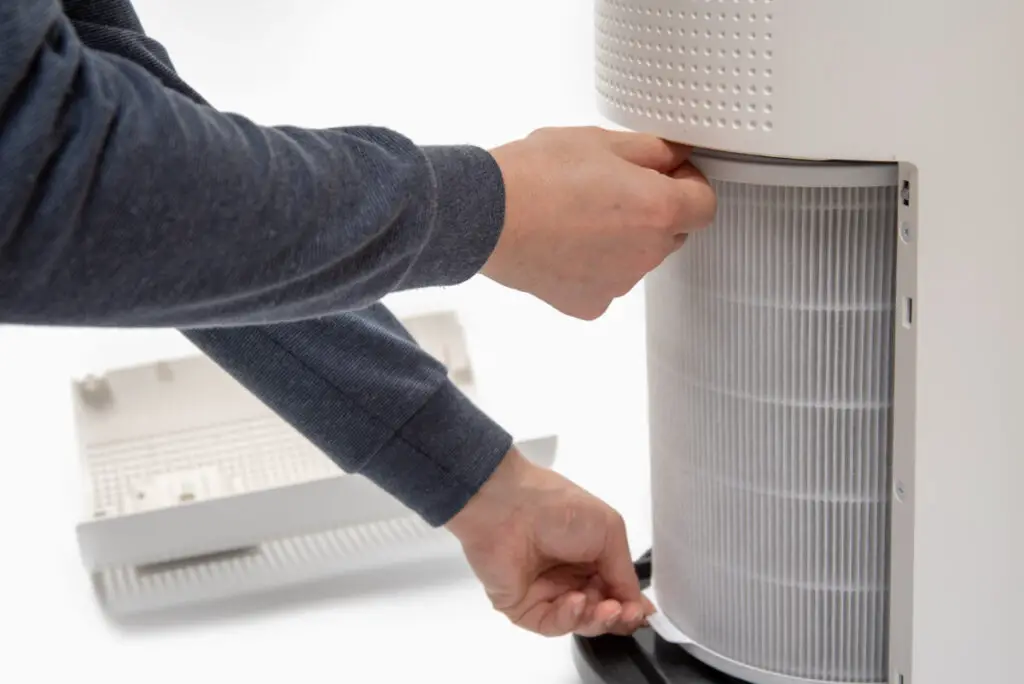
Almost all air purifiers have a pre-filter, which is a generic filter with large pores (100 to 3000 micrometers). It can only capture large dust and debris particles and primarily serves to protect the unit and improves the optimal life of other filters.
Effect on Humidity
Generic filters do not affect humidity as the tiny water molecules easily pass through the filter pores.
Activated Charcoal Filter
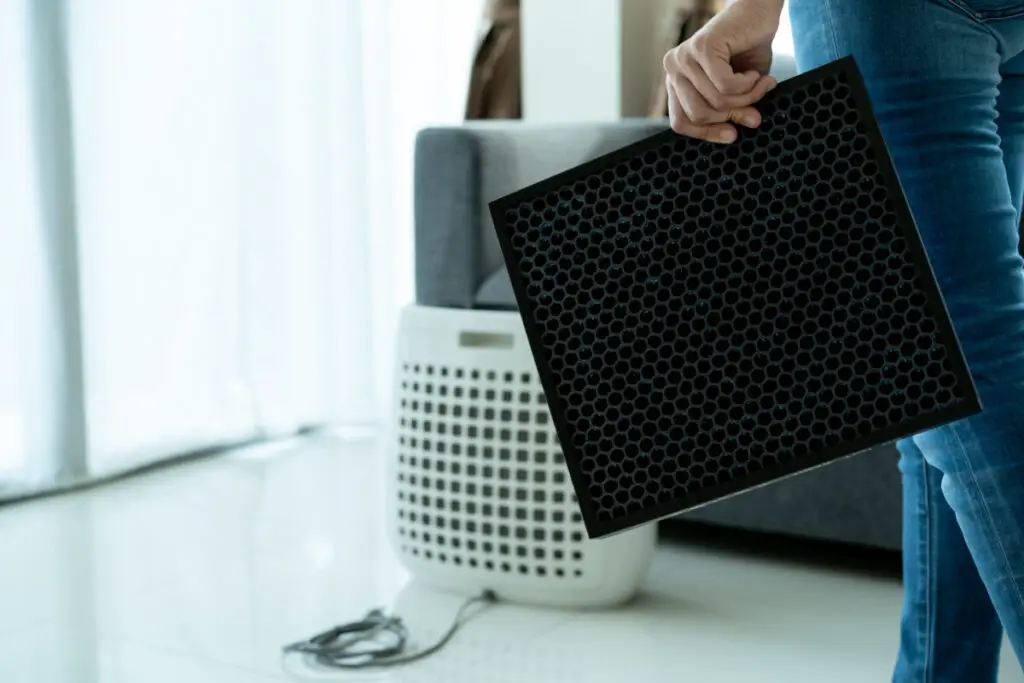
Activated charcoal filters are made of oxidized and heated carbon. They have a pore size of 0.5 to 50 micrometers.
When air flows through the unit, gases and volatile organic compounds (VOCs) are adsorbed on the charcoal and trapped inside the filter pores.
Effect on Humidity
Activated charcoal filters can reduce the moisture content of the air. Charcoal has a high affinity for moisture absorption and, therefore, has some dehumidifying effects.
However, as of yet, we do not have much evidence suggesting a significant reduction in humidity by running air purifiers with carbon filters. This is because the water molecules do not get retained in the comparatively larger filter pores.
Also, air purifiers do not have reservoirs to collect water; thus, any trapped moisture is released back into the air.
True HEPA Filter
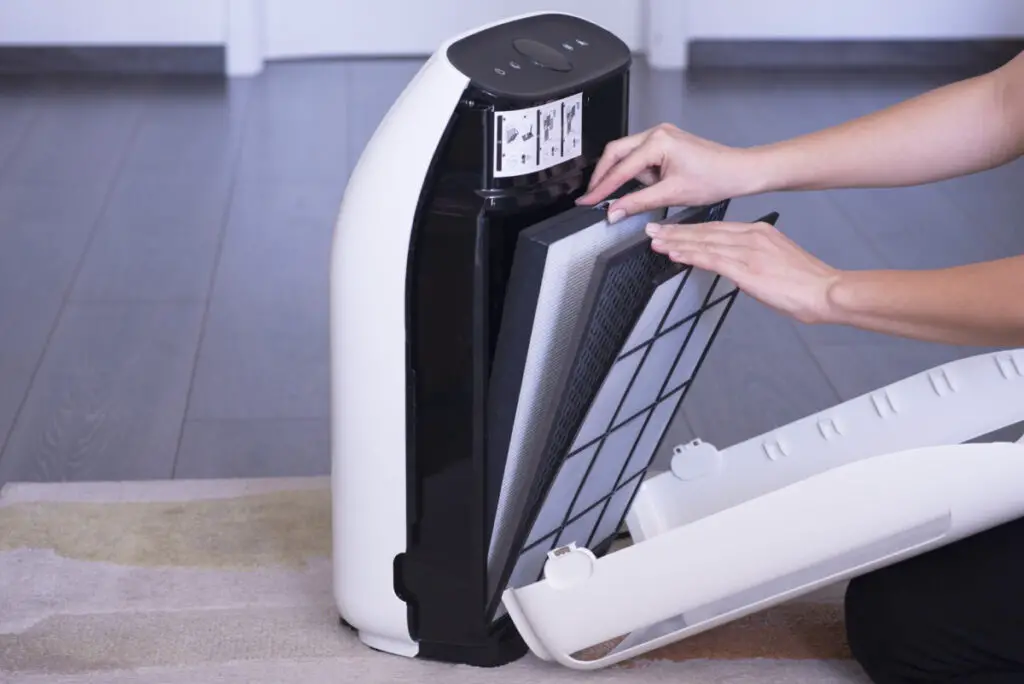
HEPA filters are one of the most efficient types of air filters. They have microscopic pores that can generally filter particles measuring 0.3 microns or more.
True HEPA filters are the ones that comply with DoE standards of HEPA filtration, delivering 99.97% efficiency. Depending on the rate of contaminant retention, these filters are subdivided into general standards (H10 to H12) and high tier (H13 and H14).
They can remove particulate matter like pollen, pet hair and dander, dust and debris, bacteria, mold spores, and numerous other pathogens.
Effect on Humidity
Although HEPA filters can trap microscopic particles, water molecules are still smaller (0.27 nanometer) than the filter’s pores. Therefore, water molecules easily escape the filter pores, resulting in a HEPA filter having no effect on humidity.
UV Light Bulb
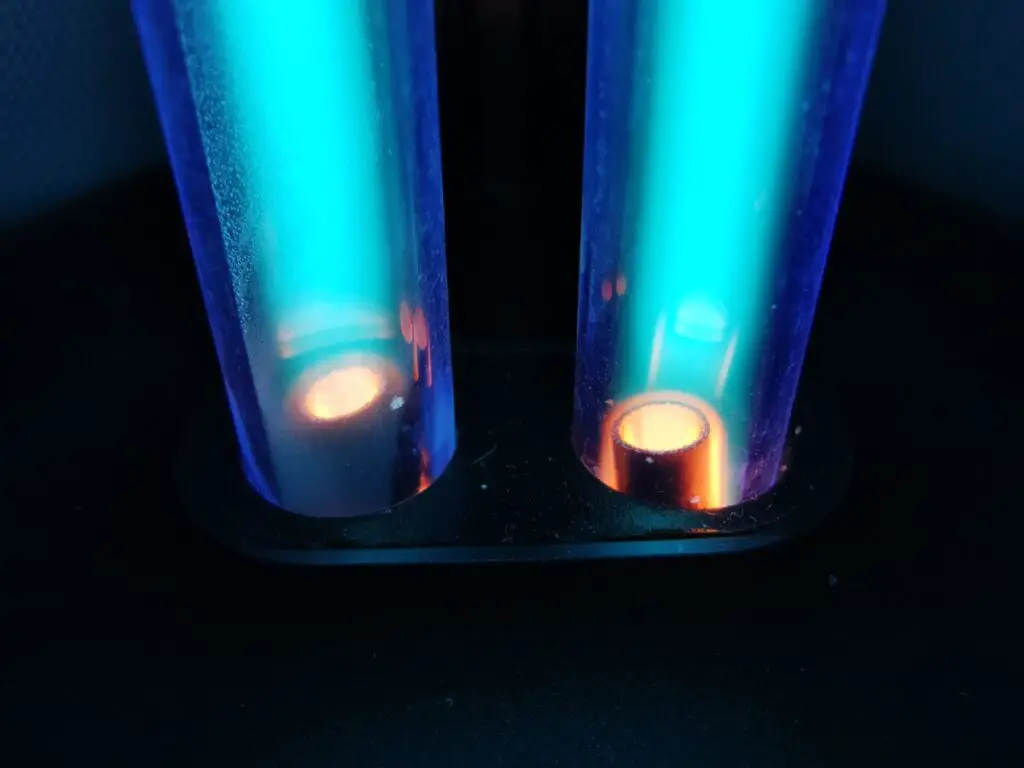
Some air purifiers have UV light bulbs installed for filtration. They emit UV lights of germicidal wavelengths (mostly UV-C light of 100 to 280nm) that kill bacteria and other pathogens in the air.
UV sterilization is used for microscopic germs. However, particulate matter and gases are not eliminated by UV radiation.
Effect on Humidity
Although UV light bulbs are sometimes used in condensate lines to reduce moisture, there is no credible evidence of these bulbs dehumidifying air in air purifiers. Even though UV bulbs tend to get hot, they do not transmit heat; therefore, there is no chance of secondary dehumidification.
Ionizer and Electrostatic Filter
Ionizers are devices that produce negative ions. These ions make a static charge, causing the airborne particles to fall and stick to the ionizer and internal surface of the unit.
Electrostatic filters are the same, except that they release a positive charge and are mostly installed as a primary filter in air purifiers.
Effect on Humidity
Ionizers and electrostatic plates only remove solid particles from the air and do not affect water and gaseous pollutants.
Activated charcoal is the only air filter capable of absorbing and retaining moisture from the air, but its effects are non-significant.
Why Is My Air Purifier Making Room Dry?
Although air purifiers do not have many dehumidifying effects, you might experience a drier environment after running your unit.
Here are some potential reasons why an air purifier might make the air feel drier:
Incompatible Unit Size
Each air purifier provides different coverage. The filtration system and fan speed determine the rate of air purification. If a unit is too large for your space, it might take time to emit filtered air out of the room, automatically reducing humid air in the room.
Buying an air purifier compatible with your room size will solve the problem. The coverage area of an appliance can be confirmed from the product description or user manual.
High Fan Speed
If your air purifier is the right size, high fan speed can cause a dry environment. Although the fan draws air inside the unit, it doesn’t circulate air into the entire space. Therefore, if humid air is drawn inside at high speed, the room will deplete a certain amount of moisture.
Most modern air purifiers allow users to set a comfortable fan speed. Switching the fan speed to low after a few hours of operation (once the air quality improves) can counter the problem.
Do I Need a Dehumidifier If I Have An Air Purifier?
Air purifiers do not significantly reduce humidity. Therefore, in humid areas (relative humidity above 50%), one needs to run a dehumidifier for a comfortable environment.
A dehumidifier will also prolong the life of the purifier in humid conditions.
Can I Use A Dehumidifier and An Air Purifier At The Same Time?
A dehumidifier and air purifier can be operated simultaneously in the same space.
If you live in a humid climate, purchasing air purifiers and dehumidifier combo units will be an economical, energy-conserving, and space-saving.
Is There a Dehumidifier That Also Purifies The Air?
Combination devices (featuring both air purifiers and dehumidifiers) can purify the air and remove excess moisture from it at the same time.
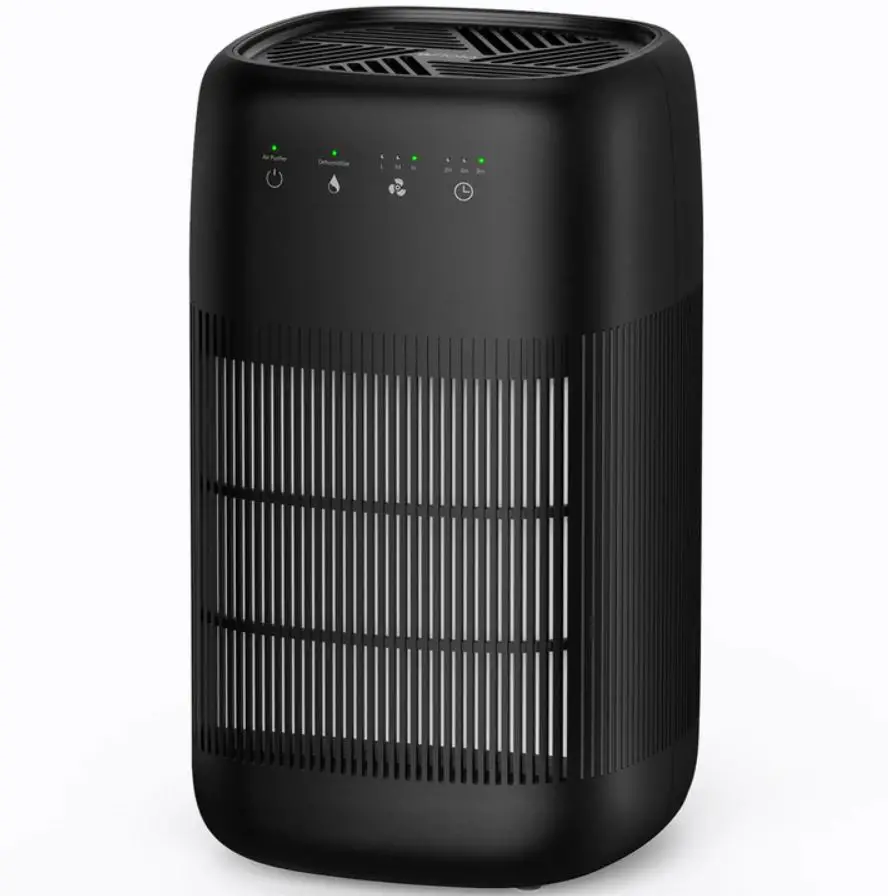
The Afloia Q10 2-in-1 is an example of a dehumidifier and air purifier combo. You can also chose to run the air purifier without the dehumidifier.
